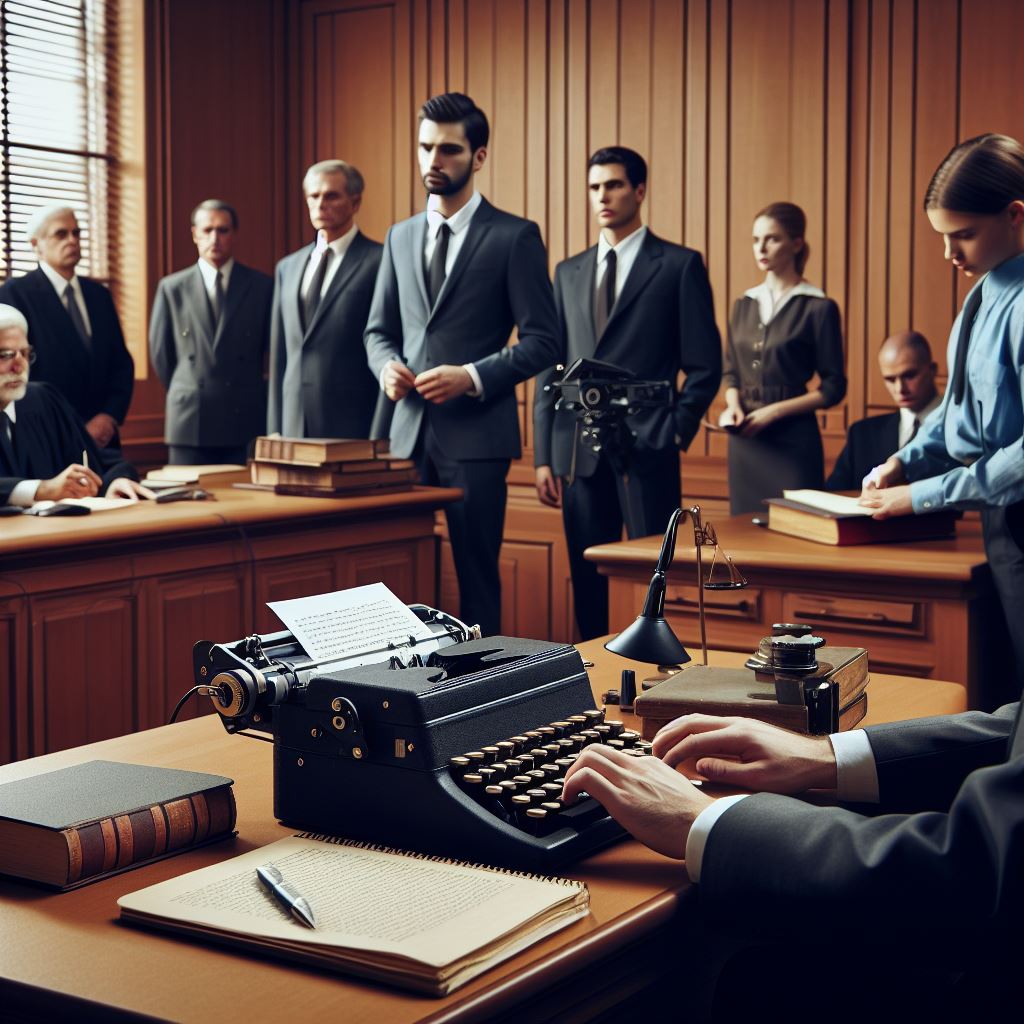Introduction
Court reporters play a crucial role in legal cases by creating accurate records of court proceedings.
Court reporters are professionals responsible for creating accurate and verbatim records of legal proceedings, such as trials, depositions, and hearings.
Using stenotype machines or voice recognition technology, they capture spoken words, gestures, and actions to produce official transcripts.
These transcripts serve as crucial documentation for legal records, appeals, and reference purposes.
Court reporters play a vital role in ensuring an accurate and complete record of proceedings, facilitating legal processes, and preserving an objective account of events.
Their attention to detail, speed, and proficiency in specialized shorthand or technology make them indispensable in the legal system.
The purpose of this blog post is to discuss the importance and responsibilities of court reporters.
Definition and Responsibilities of a Court Reporter
Definition of a court reporter
A court reporter is a professional tasked with creating an accurate and verbatim record of legal proceedings.
Overview of the role and responsibilities:
Court reporters play a crucial role in legal cases by capturing spoken words and gestures during hearings, trials, and depositions.
- Attend legal proceedings and record all spoken words
- Use stenotype machines, voice writing equipment, or other technology to create transcripts
- Ensure accuracy by carefully observing and transcribing all details
- Provide requested portions of transcripts to lawyers, judges, and other parties
- Swear in witnesses and handle administration of oaths.
- Mark exhibits and read back portions of the record when requested.
- Manage real-time reporting for instant transcription accessibility in courtrooms or remotely.
- Ensure the confidentiality and security of transcripts and recordings.
- Keep detailed logs and indexes of all proceedings and transcripts.
- Prepare, proofread, and distribute final transcripts to relevant parties.
Importance of accuracy and attention to detail:
The role of court reporters requires utmost accuracy and attention to detail for several reasons:
- Preserving an accurate record: Court reporters create an official record that can be used for future reference or appeals.
- Evidence in legal cases: Transcripts can be used as evidence during trials and investigations.
- Ensuring fairness and justice: Accurate transcripts enable parties to review and evaluate statements made during proceedings.
- Recording non-verbal cues and emotions: Court reporters capture gestures, tone, and emotions that may not be reflected in written documents.
- Assisting with legal research: Transcripts serve as valuable resources for lawyers, researchers, and students.
- Facilitating the appeals process: Accurate and detailed transcripts provide a basis for parties to file appeals, if necessary.
- Supporting legal and historical documentation: Transcripts contribute to the documentation of legal history and the legal system’s integrity.
- Transparency and accountability: Accurate transcripts promote transparency and accountability within the justice system.
Court reporters are vital members of the courtroom team, ensuring the integrity and accuracy of the judicial process.
Their transcription skills and attention to detail greatly contribute to the fair administration of justice.
Techniques and Tools Used by Court Reporters
Court reporters play a crucial role in legal cases by accurately transcribing court proceedings. To perform their job effectively, they rely on various techniques and tools. Let’s explore some of these key tools:
Stenographic machine
The stenographic machine is a specialized device used by court reporters to record spoken words verbatim.
It features a keyboard with fewer keys than a standard keyboard, and each key represents a phonetic sound or combination of sounds.
When a word is spoken, the court reporter presses multiple keys simultaneously, creating a series of symbols on a paper tape.
These symbols, known as stenographic shorthand, are later translated into readable text.
Voice writing technology
Voice writing technology allows court reporters to use their voice instead of a stenographic machine.
Using a specialized microphone, court reporters repeat everything that is said in a proceeding into a handheld device.
The device is equipped with voice recognition software, which converts the spoken words into written text.
This technology enables court reporters to capture proceedings in real-time while maintaining accuracy.
Electronic recording devices
Electronic recording devices are another commonly used tool by court reporters. These devices allow for the digital storage and playback of court proceedings.
Instead of transcribing proceedings in real-time, court reporters using electronic recording devices focus on creating detailed notes and annotations during the proceedings.
They can then review and transcribe the recordings at a later time.
Computer-aided transcription software
To enhance their efficiency and accuracy, court reporters often utilize computer-aided transcription (CAT) software.
Unlock Your Career Potential
Visualize a clear path to success with our tailored Career Consulting service. Personalized insights in just 1-3 days.
Get StartedThis software helps convert stenographic or recorded notes into official transcripts.
CAT software provides court reporters with features like automatic translation of stenographic shorthand, time-stamping functionalities, and text editing tools.
It also allows for the easy formatting and indexing of transcripts.
In essence, court reporters employ various techniques and tools to fulfill their crucial role in legal cases.
Whether it’s the stenographic machine, voice writing technology, electronic recording devices, or CAT software, these tools enable court reporters to accurately transcribe court proceedings and provide essential documentation for the legal system.
Importance of Court Reporters in Legal Cases
When it comes to legal cases, court reporters play a crucial role in ensuring the smooth proceedings of the court.
Their job involves creating accurate records of what is said during the hearings, providing transcripts for future reference, and aiding in the administration of justice.
Let’s take a closer look at why court reporters are essential in legal cases:
Ensuring an accurate record of court proceedings
One of the primary responsibilities of court reporters is to create a verbatim account of everything that is said in the courtroom.
They use specialized tools, such as stenotype machines or voice-writing technology, to transcribe every word, ensuring an accurate record of the proceedings.
This record serves as an official document that can be referred to in the future.
By capturing every spoken word, court reporters provide a reliable source for reviewing the facts, arguments, and testimonies presented during a trial.
This accuracy is crucial for preserving the integrity of the legal process.
Providing transcripts for appeals and post-trial proceedings
Court reporters play a vital role in the appeals process and post-trial proceedings. After a trial, if any party wishes to appeal the decision, they need access to the entire trial record.
Court reporters provide these parties with accurate and complete transcripts of the original proceedings.
Transcripts are crucial for lawyers preparing their arguments for an appeal.
They enable them to review the evidence, pinpoint inconsistencies, analyze the judge’s instructions, and identify potential errors that may have occurred during the trial.
Additionally, transcripts serve as the foundation for post-trial motions and other legal actions that may follow a case.
They help lawyers and judges understand the nuances of the initial trial and make informed decisions based on the recorded facts.
Aid in the administration of justice
Court reporters contribute significantly to the administration of justice by accurately documenting every detail of the proceedings.
Their impartiality ensures that no information is lost or distorted, providing a comprehensive and reliable account of what occurred in the courtroom.
The availability of complete and precise records helps legal professionals, including judges and attorneys, make fair judgments and informed decisions.
These records are essential for ensuring due process and maintaining a transparent judicial system.
Essential for lawyers, judges, and legal researchers
Lawyers heavily rely on court reporters’ transcripts for various aspects of their work. They use these records to prepare their cases, study previous court decisions, analyze legal arguments, and plan strategies.
The transcripts provide them with valuable insights into the intricacies of the trial and enable them to present compelling arguments based on the recorded evidence.
Judges also depend on court reporters’ accuracy to review critical moments during a trial, reexamine witness testimonies, and remind themselves of specific details.
This ensures that they can make well-informed, unbiased decisions based on the facts of the case.
Furthermore, court reporters’ transcripts are an invaluable resource for legal researchers.
They help scholars, students, and other legal professionals study past cases, analyze legal trends, and contribute to the advancement of the field.
Therefore, court reporters play an indispensable role in legal cases.
Their ability to create accurate records, provide transcripts, aid in the administration of justice, and support lawyers, judges, and legal researchers ensures the proper functioning of the legal system.
Read: The Role of Lawyers in Canadian Society

Training and Education for Court Reporters
Certification and Licensure Requirements
- Court reporters must meet specific certification and licensure requirements to practice in the legal field.
- The requirements vary depending on the jurisdiction, but typically include passing a written and skills exam.
- Certification and licensure ensure that court reporters possess the necessary skills and expertise.
- These requirements also help maintain professionalism and uphold the integrity of the court reporting profession.
- Continuing education units (CEUs) may be required for court reporters to renew their certification or license periodically.
- CEUs ensure that court reporters stay updated with the latest industry standards and practices.
- By meeting certification and licensure requirements, court reporters demonstrate their commitment to their profession.
Formal Education Programs and Training
- Court reporters typically complete formal education programs and training to acquire the necessary skills.
- These programs are offered by universities, colleges, and specialized court reporting schools.
- The curriculum includes courses in stenography, legal terminology, transcription, and technology.
- Students also learn about courtroom procedures, ethics, and the role of court reporters in legal cases.
- Training may involve classroom instruction, hands-on practice, and internships to gain real-world experience.
- Formal education programs provide a strong foundation for aspiring court reporters to excel in their careers.
- Upon completion of the program, graduates may be awarded a certificate, diploma, or associate’s degree.
Continuing Education and Professional Development
- Continuing education is essential for court reporters to stay current with advancements in technology and legal procedures.
- Court reporting associations and organizations offer various continuing education opportunities for professionals.
- These include workshops, webinars, conferences, and seminars on topics relevant to court reporting.
- Continuing education helps court reporters enhance their skills, improve accuracy, and stay updated with industry trends.
- It also allows them to network with colleagues and exchange knowledge and experiences.
- Professional development opportunities help court reporters grow in their careers and take on more challenging roles.
- By continuously learning and expanding their knowledge, court reporters can provide better service to the legal community.
In fact, training and education are crucial for court reporters to excel in their profession.
Certification and licensure requirements ensure that court reporters possess the necessary skills and maintain professionalism.
Formal education programs provide a strong foundation, equipping court reporters with the knowledge and expertise needed in the legal field.
Continuing education and professional development opportunities allow court reporters to stay updated with industry advancements and further enhance their skills.
By investing in their training and education, court reporters can contribute to the effective administration of justice and play a vital role in legal cases.
Read: Pro Bono Work: Lawyers Giving Back
Job Outlook and Demand for Court Reporters
Historical and current trends in the field
Over the years, the role of court reporters has evolved significantly. They are no longer just responsible for creating verbatim transcripts of legal proceedings.
Court reporters now play a crucial role in the accurate and efficient administration of justice.
In the past, court reporters used shorthand or stenotype machines to transcribe court proceedings.
These methods were time-consuming and required significant manual effort. However, with advancements in technology, court reporting has become more streamlined and efficient.
Advancements such as computer-aided transcription (CAT) systems and voice recognition software have revolutionized the field.
These tools have helped court reporters maintain speed and accuracy while reducing the time and effort required to transcribe proceedings.
Additionally, the widespread use of video conferencing technology has given rise to remote court reporting.
This allows court reporters to participate in hearings and depositions from anywhere in the world, further expanding their job opportunities.
Due to the increasing complexity of legal cases and the need for accurate record-keeping, the demand for court reporters remains high. The services provided by court reporters are indispensable in both civil and criminal proceedings.
Advancements in technology and the impact on the profession
The advancements in technology have both positively and negatively impacted the court reporting profession.
On one hand, the introduction of CAT systems and voice recognition software has made the process of transcribing proceedings faster and more accurate.
This has enabled court reporters to handle larger workloads and increased their productivity.
On the other hand, the rise of digital audio recording systems has led some to believe that court reporters may become obsolete.
However, these systems have their limitations, as they can be prone to errors and require extensive editing and proofreading.
Court reporters, with their unique skills and expertise, are able to capture nuances in tone, inflections, and emotions that technology alone cannot replicate.
This human element is crucial in accurately depicting the context and atmosphere of legal proceedings.
The demand for court reporters is expected to remain strong, especially in specialized areas such as closed captioning and real-time transcription for deaf or hard-of-hearing individuals.
Salary and job growth prospects
Court reporters receive competitive salaries for their specialized skills and responsibilities.
According to the Bureau of Labor Statistics, the median annual wage for court reporters was $61,660 in May 2020.
Job growth prospects for court reporters are projected to be steady.
The increasing number of legal cases, coupled with the retirement of experienced court reporters, will create job opportunities in the field.
Federal and state governments, as well as other entities such as captioning companies and freelance agencies, will continue to require the services of court reporters.
The demand for real-time transcription in broadcast captioning and webcasting is also expected to contribute to the job growth in this profession.
In general, the job outlook for court reporters is promising. Advancements in technology have enhanced their efficiency and opened up new avenues for remote work.
Despite the potential challenges posed by technological innovations, court reporters remain a vital component of the legal system, ensuring accuracy, fairness, and transparency in legal proceedings.
Read: The Impact of AI on the Legal Profession
Challenges Faced by Court Reporters
High-pressure environments and time constraints
- Court reporters often work in high-pressure environments where accuracy and speed are crucial.
- They must be able to keep up with fast-paced courtroom proceedings and maintain composure.
- Time constraints add additional stress, requiring court reporters to transcribe quickly without sacrificing accuracy.
- The pressure to capture every word correctly while managing time can be challenging.
- One mistake could have significant consequences for the outcome of a legal case.
Difficulties in accurately transcribing technical terminology
- Court cases involve specialized fields with their own technical terminology.
- Court reporters must be knowledgeable in legal terms, medical jargon, scientific concepts, and more.
- Accurately transcribing technical terminology requires extensive training and research.
- Misinterpreting or misspelling terms could lead to misunderstandings or inaccuracies in the court record.
- Court reporters need to be constantly updating their knowledge to keep pace with evolving terminology in various fields.
Limited opportunities for advancement within the field
- Although court reporting is a vital profession, there are limited opportunities for advancement.
- Most court reporters work as freelancers or for court reporting agencies, without many options for career progression.
- Advancement may be available in the form of becoming an official court reporter or specializing in other areas.
- However, these opportunities are limited and may require additional qualifications or experience.
- Due to the scarcity of advancement prospects, some court reporters may feel stuck in their careers.
Generally, Court reporters face various challenges in their profession, including high-pressure environments, difficulties in transcribing technical terminology accurately, and limited opportunities for advancement.
They must work diligently to ensure accurate transcription while managing time constraints and keeping up with evolving terminology.
Despite these challenges, court reporters play a vital role in legal cases, providing a verbatim record that is essential for the justice system.
Read: Salary Expectations for Court Reporters
Learn More: Work-Life Balance in the Legal Profession
Conclusion
Recap of the role of court reporters in legal cases
Court reporters play a crucial role in legal cases by providing an accurate and verbatim record of courtroom proceedings.
They use specialized equipment to transcribe spoken words into a written form that can be used as evidence or for reference.
Court reporters are responsible for ensuring that all parties, including judges, attorneys, and witnesses, are accurately recorded.
Their transcripts are often used for appeals, preparing legal briefs, and reviewing testimonies.
Without court reporters, it would be difficult to have a reliable and complete record of what happened during a trial or hearing.
Final thoughts on the importance and impact of court reporters
From maintaining the integrity of the judicial process to facilitating access to justice, court reporters play a vital role in the legal system.
Their work ensures that legal proceedings are properly documented, which contributes to fairness, transparency, and accountability in the justice system.
Furthermore, court reporters possess exceptional listening and typing skills, attention to detail, and a deep understanding of legal terminology.
Their ability to accurately transcribe complex legal proceedings is invaluable in building strong cases, preserving the rights of all involved parties, and promoting a just legal system.
Court reporters are unsung heroes in the legal world. Their dedication and professionalism are essential in upholding the principles of justice and ensuring a fair and accurate representation of legal cases.




